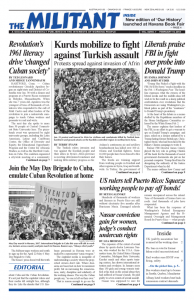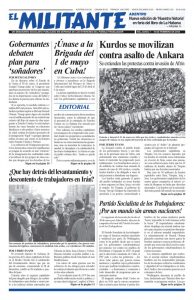Across the Kurdish region in northern Syria, in Iraqi Kurdistan, in Europe and North America and cities around the world, opponents of the Turkish government’s deadly bombing and ground invasion of Afrin canton in northwest Syria have taken to the streets to protest the assaults. The Turkish rulers aim to drive the Kurdish People’s Protection Units (YPG) out of Afrin and deal blows to the Kurds’ fight for national rights across the region. So far they have made little headway.
Kurds and their allies, including Yazidis and Christians, from Raqqa, Deir el-Zour, Manbij and elsewhere, were part of solidarity convoys of hundreds of buses, cars and motorcycles that converged on Afrin. The main contingent from northeast Syria, which had to pass through Syrian government checkpoints that stand between the two Kurdish areas, entered Afrin Feb. 6. Residents in the city lined the streets to welcome their arrival.
“We came all this way to tell our brothers in Afrin they are not alone and that we are with them,” Qamra Ali from Qamishli told the Daily Star. Two days earlier thousands of Afrin residents had turned out to protest the assault by the Turkish army and Free Syrian Army forces they train and finance.
The convoy and public street protests throughout Afrin province are one sure indication of how little progress Ankara’s forces have made. Even with an enormous advantage in firepower — air power, artillery and tanks — they are having serious difficulty against the Kurds and the deep support they have among working people in the area.
In Iraqi Kurdistan protests against the Turkish rulers’ assault took place in Erbil, capital of the Kurdistan Regional Government, Feb. 3 and in Halabja Jan. 31.
Kurds in Halabja had themselves received solidarity from Iranian Kurds in 1988, when the U.S.-backed Saddam Hussein regime dropped deadly chemical weapons on the town, killing 5,000 residents and injuring 10,000 more. When those fleeing the horrifying attacks reached nearby Iran, Kurds there lined the roads to offer whatever they had to the refugees.
On Feb. 5 high school students and teachers in Kobani — where YPG fighters successfully defended that city at great sacrifice from Islamic State in 2014 — demonstrated in solidarity with Kurds in Afrin. During the battles in Kobani, YPG fighters got support from Iraqi Kurdish peshmerga forces.
“We defended Kobani yesterday, we will defend Afrin today,” Sarkawt Abdullazada told a rally of over 100 Kurds and their supporters in Auckland, New Zealand, Feb. 3.
“We join you in opposing the Turkish government’s military assault against the Kurdish people in Syria and we condemn Washington and Moscow for giving a green light to this aggression,” Patrick Brown told demonstrators, speaking for the Communist League.
Actions in Bonn, Germany; Rotterdam, Netherlands; and Paris and Strasbourg, France took place Feb. 3 and 4.
Dozens of people protested in Union Square in New York City Feb. 3, chanting “Hands off Afrin.” That same day Kurds and their supporters rallied in Toronto.
Mike Tucker in New Zealand contributed to this article.

